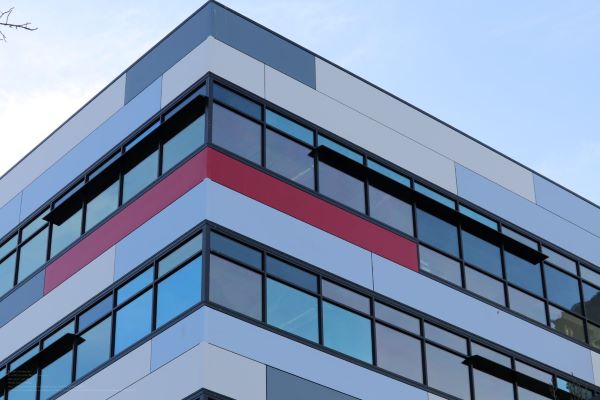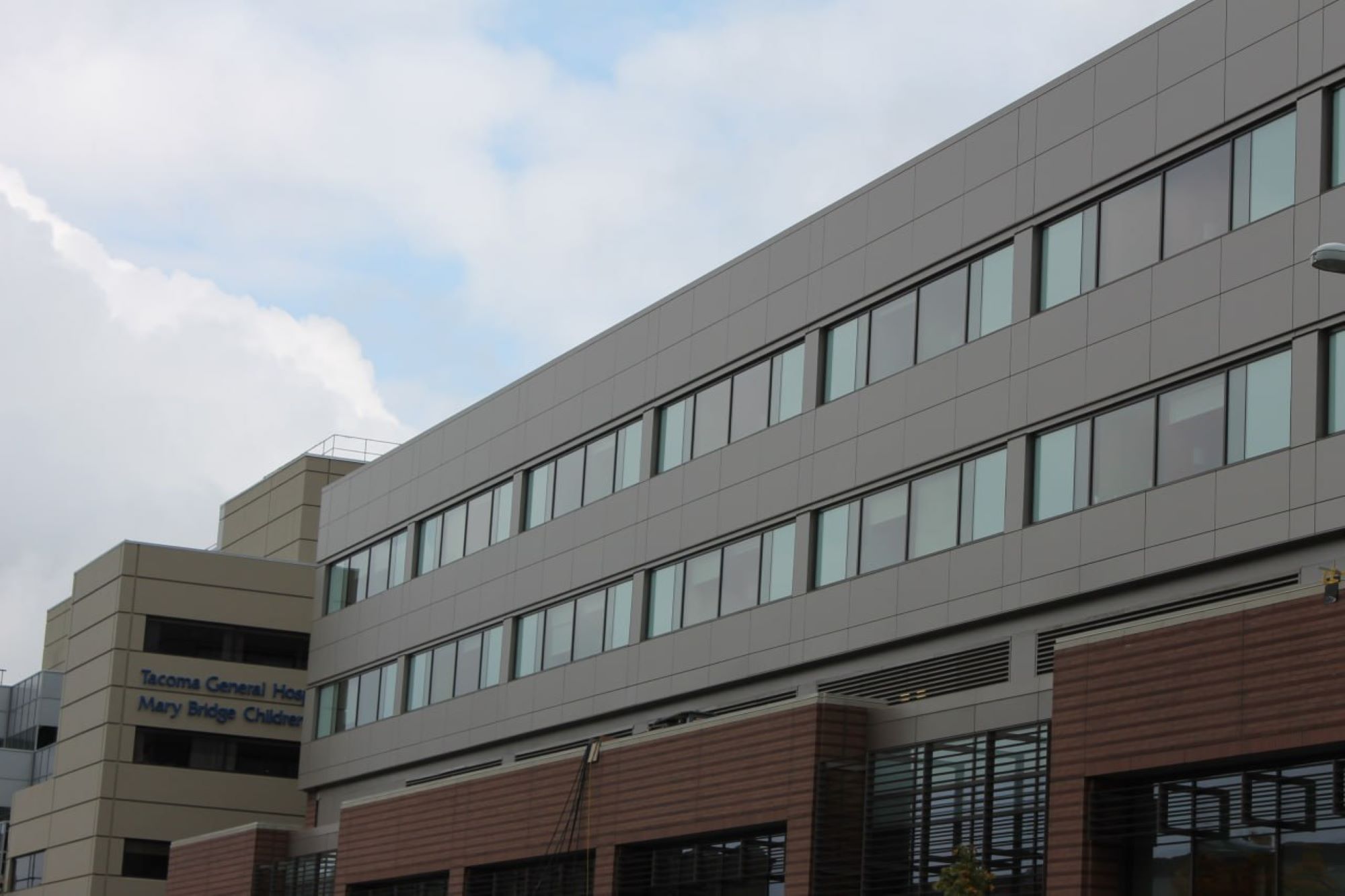A Guide to High-Performance Architectural Metal Systems
In the world of modern construction, the exterior of a building, or the building envelope, is crucial for both its aesthetic appeal and its functional performance. When it comes to a building’s facade, two of the most popular choices are insulated metal panels and composite wall panels. While both are considered architectural metals and offer a sleek, contemporary look, they have distinct differences in their composition, installation, and overall benefits. Understanding these nuances is essential for any project aiming for optimal results. At Bassett Construction, we provide expert panel system installation in Washington, guiding clients through these critical decisions to ensure the best possible outcome for their project.
The Foundations of Modern Wall Systems
Both insulated metal panels and composite wall panels are critical components in creating a high-performance wall system. However, they are fundamentally different in their design and purpose.
Insulated Metal Panels
An insulated metal panel is a prefabricated product that serves as a single-source solution for a building’s exterior. These panels consist of two metal wall panels with an insulating foam core sandwiched in between. The integrated nature of this product means that a single panel provides the exterior finish, insulation, and vapor barrier. This all-in-one design significantly contributes to the building’s energy efficiency, making these panels ideal for temperature-controlled buildings. Our integrated envelope systems approach allows for a streamlined installation, which can lead to a quicker project timeline.
Composite Wall Panels
Composite wall panels, often known as metal composite material, are a different type of metal cladding. They are composed of two thin sheets of metal—typically recycled aluminum or stainless steel—bonded to a non-metal core. These composite panels are celebrated for their exceptional flatness and rigidity. Unlike insulated metal panels, a composite panel system is a component of a larger system, often functioning as a rain-screen system that protects the building from the elements while managing moisture. The installation of a composite panel system is typically more intricate, requiring a separate framing system and insulation layer.
The Rise of Architectural Sheet Metal
The evolution of these panel systems is a testament to the advancements in architectural sheet metal. Modern fabrication and design have given rise to a variety of options, from single-skin metal panels to more complex composite and insulated systems. This has allowed for unprecedented creativity in building design, transforming a building’s exterior into an architectural fixture.
Do You Need Panel System Installation?
Don’t wait—Contact us today to have the best Panel System Installation service!
Installation Methods and Their Implications
The installation process is a key differentiator between insulated metal panels and composite wall panels, impacting project schedules and the required level of expertise. Our building envelope consultants understand these differences and work to ensure a seamless execution for every project, from the initial design build phase to completion.
The Streamlined Installation of Insulated Metal Panels
The installation of insulated metal panels is a highly efficient process due to their prefabricated nature. Because the panels combine insulation and cladding into a single unit, they are directly fastened to the building’s structural framing. This eliminates multiple steps on-site, which can lead to faster project completion. The large scale of these insulated metal walls means fewer joints and seams, which improves thermal performance and reduces the risk of water intrusion.
The Precision Installation of Composite Wall Panels
The installation of a composite panel system is a multi-step, precision-oriented process. First, a sub-framing system is installed on the building, providing a level surface. A separate insulation layer is then applied, followed by the installation of the panels. This method, while more labor-intensive, offers unparalleled design flexibility. Custom-fabricated facades can be created by cutting and shaping composite panels on-site to form intricate designs and unique geometries. This process is crucial for achieving a sleek, seamless look with a concealed fastener panel system. The precision required for this type of installation highlights the need for experienced professionals to prevent project delays and ensure the final product meets the highest standards.
The Value of Professional Expertise and Constructability

The success of any panel system installation in Washington hinges on the expertise of the installation team. A project’s long-term performance, from its energy efficiency to its ability to protect the building, is directly tied to the quality of the installation.
The Role of Constructability Reviews
A thorough constructability review process is essential to a successful project. During this review, our team assesses the feasibility of the design from a practical standpoint, identifying potential challenges before they can impact the schedule or budget. This proactive approach allows us to suggest alternatives and solutions that ensure a smooth installation process. We can offer solutions for complex details such as thermal movement in the metal siding, ensuring the integrity of the cladding system over time.
Best Practices for a Successful Panel System Project
A successful panel system installation in Washington requires careful planning and a commitment to best practices from design through completion. Working with a firm that understands the intricacies of both insulated metal panels and composite wall panels is the first step toward achieving an outstanding result in the Puget Sound Area.
Comprehensive Consultation
The project’s success begins with a thorough design and consultation phase. Our building envelope consultants can help clients understand the technical specifications and performance characteristics of different panels, assisting in the selection of the best material for the project’s specific needs. This early-stage collaboration ensures that the architectural vision aligns with practical and structural requirements.
The Right Partner for Your Panel System Project
The choice between insulated metal panels and composite wall panels is a significant decision that impacts a building’s performance, aesthetics, and overall project timeline. While insulated metal panels offer a high-performance, streamlined solution, composite wall panels provide unmatched design flexibility for creating a genuinely unique facade. The success of either system depends on working with a firm that possesses the expertise, knowledge, and craftsmanship to handle these complex materials. At Bassett Construction, we are committed to helping our clients make the right choices and execute their projects to the highest standard. Panel System Installation services in Washington ensure that every project, from simple single-skin envelope systems to complex custom-fabricated facades, is completed with precision and care, delivering a finished product that is both beautiful and built to last.
Other Construction services we provide
- Architectural Metal Design in Washington: We specialize in creating innovative and visually stunning metal enclosures and features that elevate the aesthetics and functionality of your building.
- Building Envelope Consultants in Washington: Our expert team provides comprehensive guidance and solutions for your building’s exterior, ensuring superior performance, durability, and weatherproofing of critical structures.
- Custom Fabricated Facades in Washington: We design and fabricate unique, custom facades that transform a building’s exterior into a work of art, combining sleek design with structural integrity.
Do You Need Panel System Installation?
Don’t wait—Contact us today to have the best Panel System Installation service!
FAQs About Panel System Installation in Washington
Connect With Us
Phone: (360) 718-8640
Location: 9210 NE 62nd Ave Bldg B, Suite 210, Vancouver, WA 98665

